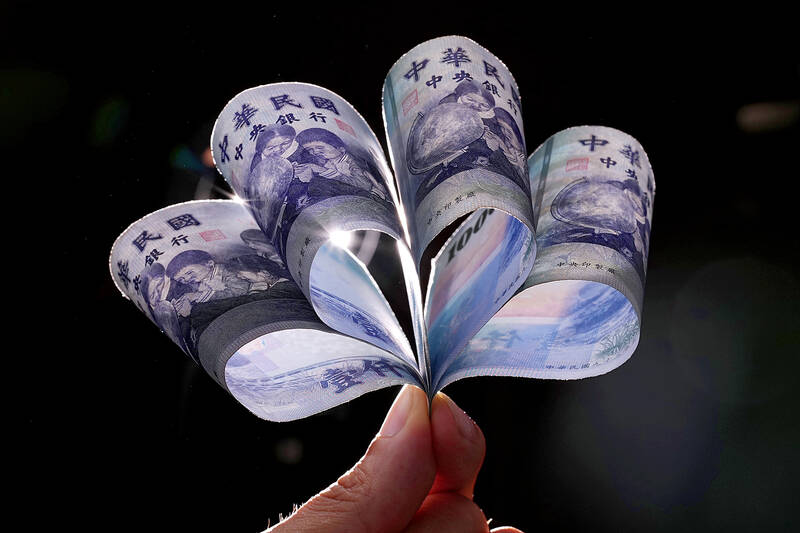A surging New Taiwan dollar is proving a double-edged sword for the economy, undermining export competitiveness while helping lower import costs, a familiar dilemma for domestic exporters, the central bank said yesterday, as the local currency has risen more than 10 percent against the US dollar this year.
Taiwan has weathered similar cycles, central bank Deputy Governor Yen Tzung-ta (嚴宗大) said at a meeting of the legislature’s Economics Committee, citing the 2019–2022 period when the NT dollar appreciated to NT$27.532 against the greenback.
Despite that, exports jumped 13.9 percent as GDP grew 4.3 percent, outperforming most major economies, thanks to remote working and schooling during the COVID-19 pandemic driving tech demand Yen said.

Photo: CNA
The local currency’s strength this year reflects robust export momentum, driven by booming demand for chips and electronics used in artificial intelligence (AI) applications, even as global markets assess the implications of US President Donald Trump’s evolving tariff policy, he said.
The NT dollar closed at NT$29.391 against the US dollar in Taipei trading yesterday, having gained 12.3 percent since April, central bank data showed.
A stronger currency is not entirely a burden, as many manufacturers import raw materials, Yen said.
“A strong NT dollar helps lower input costs, which can help protect profit margins,” he said.
From 2015 to 2021, Taiwanese listed companies recorded NT$116.7 billion (US$3.97 billion) in foreign exchange losses, but from 2022 to last year, they posted NT$474.9 billion in foreign exchange gains, yielding a net benefit of NT$358.2 billion, he said.
Despite recent volatility, the NT dollar remains relatively stable compared with other currencies, such as the yen, euro and won, he said.
Many firms also manage their foreign exchange exposure through forward contracts or natural hedging strategies, limiting their vulnerability to short-term swings, he said.
Taiwanese exporters can adapt by raising prices, shifting orders, and emphasizing high-margin or value-added products, he said.
Over the longer term, they are diversifying their markets and supply chains to build resilience, he added.
“Past experience shows that Taiwan has a certain degree of resilience to currency appreciation,” he said.
The central bank remains committed to maintaining stability in the foreign exchange market, he said.
It does not need to intervene aggressively to meet that goal, but stands ready to adjust policy if needed to keep the currency relatively stable against global peers, he said.
Moreover, the central bank is closing monitoring foreign capital flows to prevent speculative currency plays through inverse exchange-traded funds (ETFs), he said.
To curb such risks, the central bank and the Financial Supervisory Commission reached a consensus as early as 2020, capping foreign investors’ holdings of inverse ETFs at 30 percent of total issuance, he said.
Yen said the central bank monitors foreign activity daily and would swiftly order capital outflows if it detects currency speculation, in line with what he described as a “guest eviction order.”

South Korea’s equity benchmark yesterday crossed a new milestone just a month after surpassing the once-unthinkable 5,000 mark as surging global memory demand powers the country’s biggest chipmakers. The KOSPI advanced as much as 2.6 percent to a record 6,123, with Samsung Electronics Co and SK Hynix Inc each gaining more than 2 percent. With the benchmark now up 45 percent this year, South Korea’s stock market capitalization has also moved past France’s, following last month’s overtaking of Germany’s. Long overlooked by foreign funds, despite being undervalued, South Korean stocks have now emerged as clear winners in the global market. The so-called “artificial intelligence

NEW IDENTITY: Known for its software, India has expanded into hardware, with its semiconductor industry growing from US$38bn in 2023 to US$45bn to US$50bn India on Saturday inaugurated its first semiconductor assembly and test facility, a milestone in the government’s push to reduce dependence on foreign chipmakers and stake a claim in a sector dominated by China. Indian Prime Minister Narendra Modi opened US firm Micron Technology Inc’s semiconductor assembly, test and packaging unit in his home state of Gujarat, hailing the “dawn of a new era” for India’s technology ambitions. “When young Indians look back in the future, they will see this decade as the turning point in our tech future,” Modi told the event, which was broadcast on his YouTube channel. The plant would convert

‘SEISMIC SHIFT’: The researcher forecast there would be about 1.1 billion mobile shipments this year, down from 1.26 billion the prior year and erasing years of gains The global smartphone market is expected to contract 12.9 percent this year due to the unprecedented memorychip shortage, marking “a crisis like no other,” researcher International Data Corp (IDC) said. The new forecast, a dramatic revision down from earlier estimates, gives the latest accounting of the ongoing memory crunch that is affecting every corner of the electronics industry. The demand for advanced memory to power artificial intelligence (AI) tasks has drained global supply until well into next year and jeopardizes the business model of many smartphone makers. IDC forecast about 1.1 billion mobile shipments this year, down from 1.26 billion the prior

People stand in a Pokemon store in Tokyo on Thursday. One of the world highest-grossing franchises is celebrated its 30th anniversary yesterday.